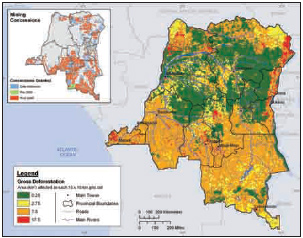Returns from carbon offsets could beat palm oil in Congo DRC
Returns from carbon offsets could beat palm oil in Congo DRC
Rhett Butler, mongabay.com
December 4, 2007
A proposal to pay the Democratic of Congo (DRC) for reducing deforestation could add 15-50 percent to the amount of international aid given to the warn-torn country, reports a new study published by scientists at the Woods Hole Research Center (WHRC). The funds would help alleviate rural poverty while cutting emissions of greenhouse gases and protecting threatened biodiversity.
The authors, lead by WHRC scientist Nadine Laporte, estimate that a 50 percent reduction in carbon emissions from deforestation in DRC, would require a mean carbon price of $19-65 per ton and generate $120-400 million per year for ten years for rural households. Carbon currently trades at more than $90 for certified emission-reduction credits ($25 per ton of carbon dioxide) in Europe.
The report, titled “Reducing CO2 emissions from deforestation and forest degradation in the Democratic Republic of the Congo”, notes that most deforestation in DRC is driven by small-scale slash-and-burn agriculture, an activity that produces low economic benefits. However in the future, as order returns to the country, logging and forest conversion for oil palm plantations are expected to accelerate. A recent analysis by the WHRC estimated that 61% of the DRC’s tropical forest is suitable for the production of oil palm. Tellingly, in October 2007, a Chinese company signed a billion-dollar contract to develop more than 3 millions hectares of the DRC from oil palm plantations. The authors say the deal provides a price signal to compare the proceeds from palm oil to carbon credits. If carbon is priced at more than $3.33 per ton, it will beat the opportunity cost of forging conversion for oil palm.

Distribution of deforestation and mining concessions (insert-top-left) in the DRC. Economic necessity and a potentially vast income from mining epitomize the trade-off s between development and resource protection faced by the DRC. Deforestation in the DRC is in large part a result of household clearing for slash-and-burn agriculture. |
The authors say that a market-based mechanism for carbon, currently under discussion at the U.N. climate meeting in Bali, could allow for sustainable economic diversification for DRC by putting a value on the ecosystem services of conserved forest lands.
“The DRC stands poised to enter an era of stability and economic development,” write the authors. “As with other countries with large forest estates and low deforestation, this economic development will put at risk large carbon stocks. It is important that these countries access carbon financing that differentiates the carbon between stocks and flows and accurately estimates the opportunity costs of reducing deforestation.”
“The DRC can eventually sell a bundle of differentiated carbon goods on the market that include carbon in protected areas, carbon in logging concessions and carbon in household and community lands. The first two represent the maintenance of carbon stocks in some form of “avoided deforestation” and the third “reduced deforestation.’ As essentially different goods, they can be priced differently.”
Laporte, N. et al (2007). Reducing CO2 emissions from deforestation and forest degradation in the Democratic Republic of the Congo [PDF]. Presented by the Woods Hole Research Center at the United Nations Framework Convention on Climate Change (UNFCCC) Conference of the Parties (COP), Thirteenth session 3-14 December 2007 in Bali, Indonesia.
Related articles
Emissions proposal could generate $200m/year for DR Congo
The Democratic Republic of Congo could earn hundreds of millions of dollars through a global warming proposal under consideration this week at U.N. climate negotiations in Nairobi, Kenya.
Britain invests $100M to protect Congo rainforest
(3/23/2007) Britain will invest nearly $100 million in a initiative to protect the Congo rainforest, the second largest tropical forest in the world. Ten other countries are also supporting the project.







